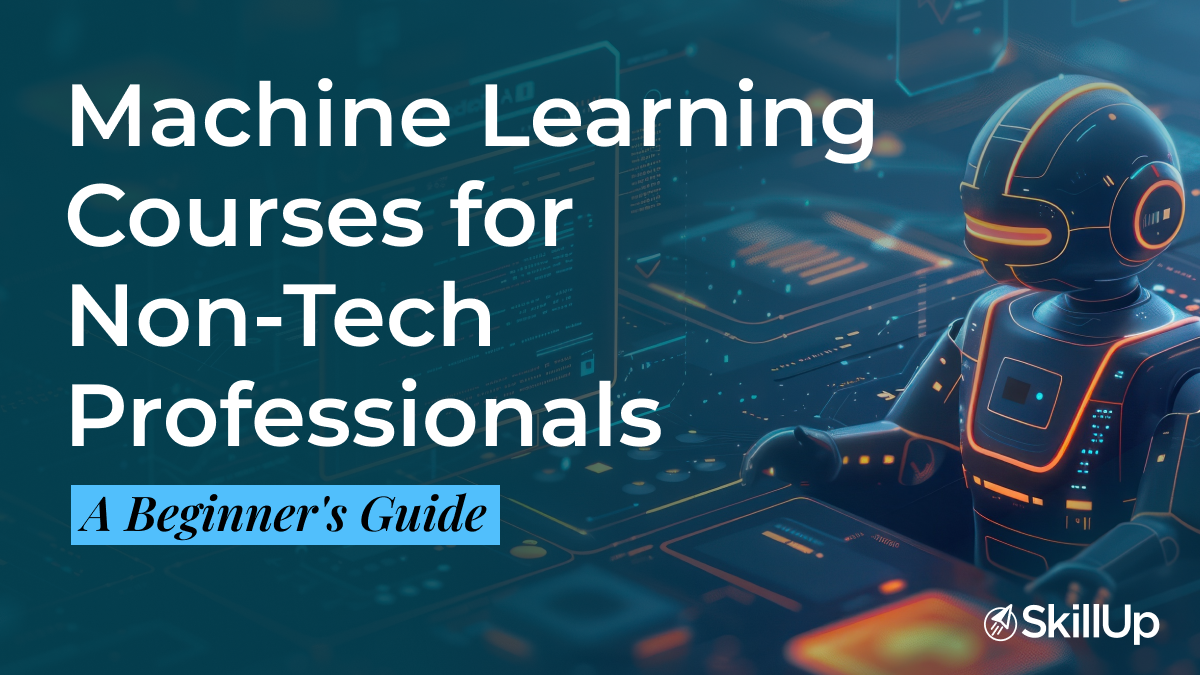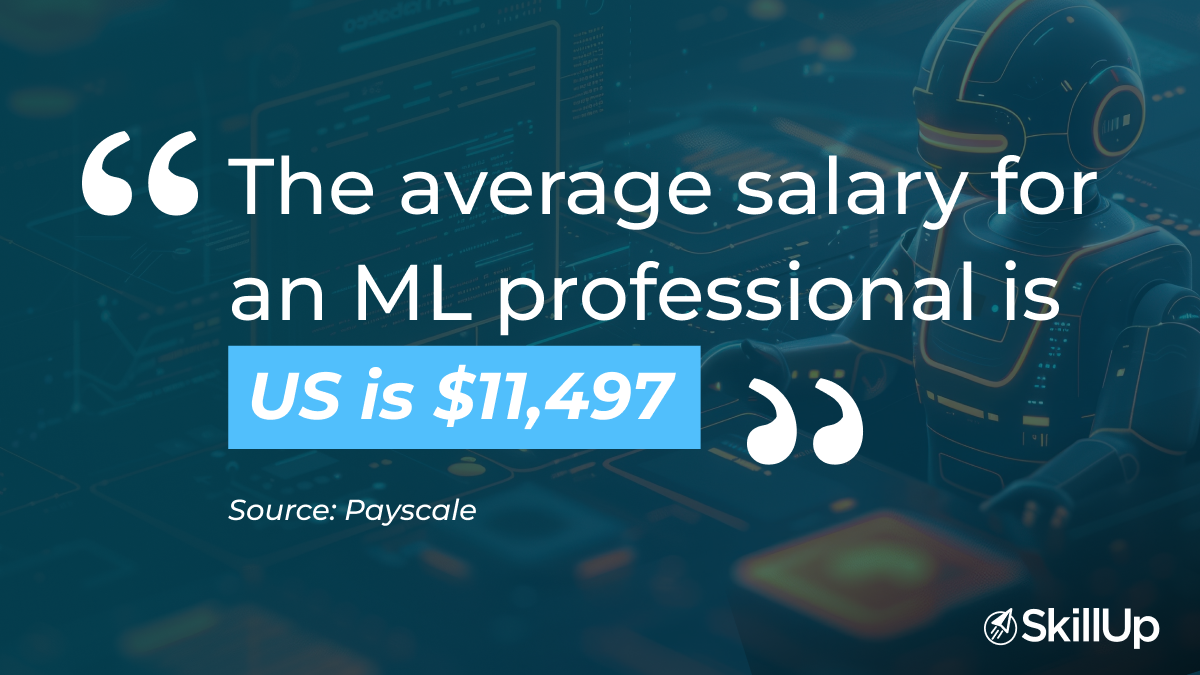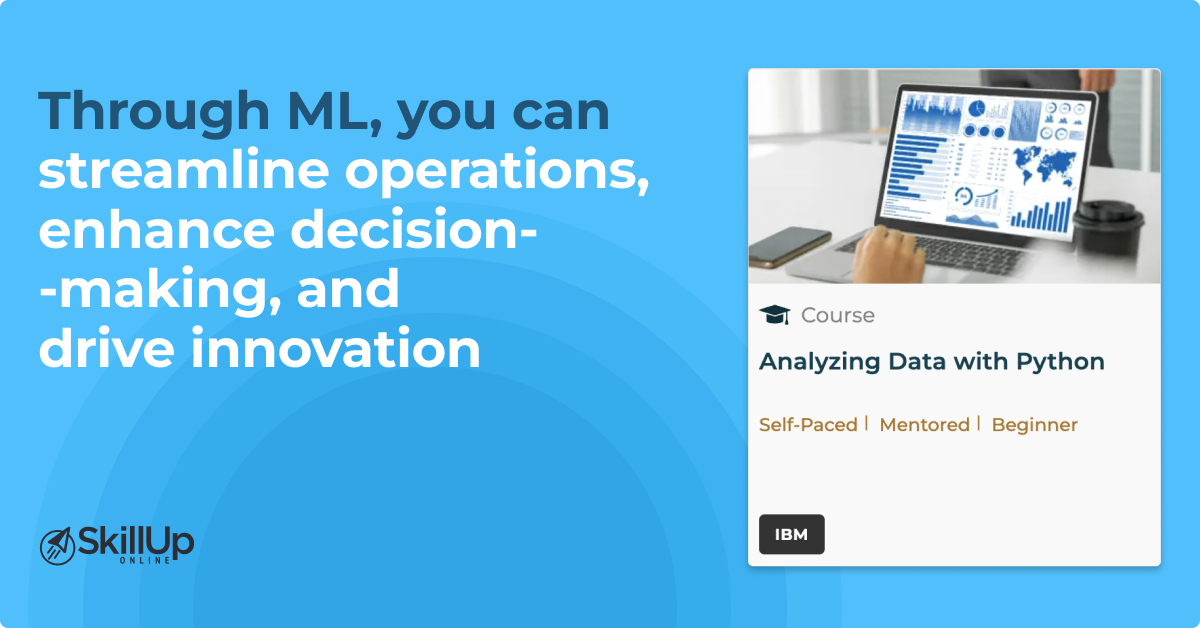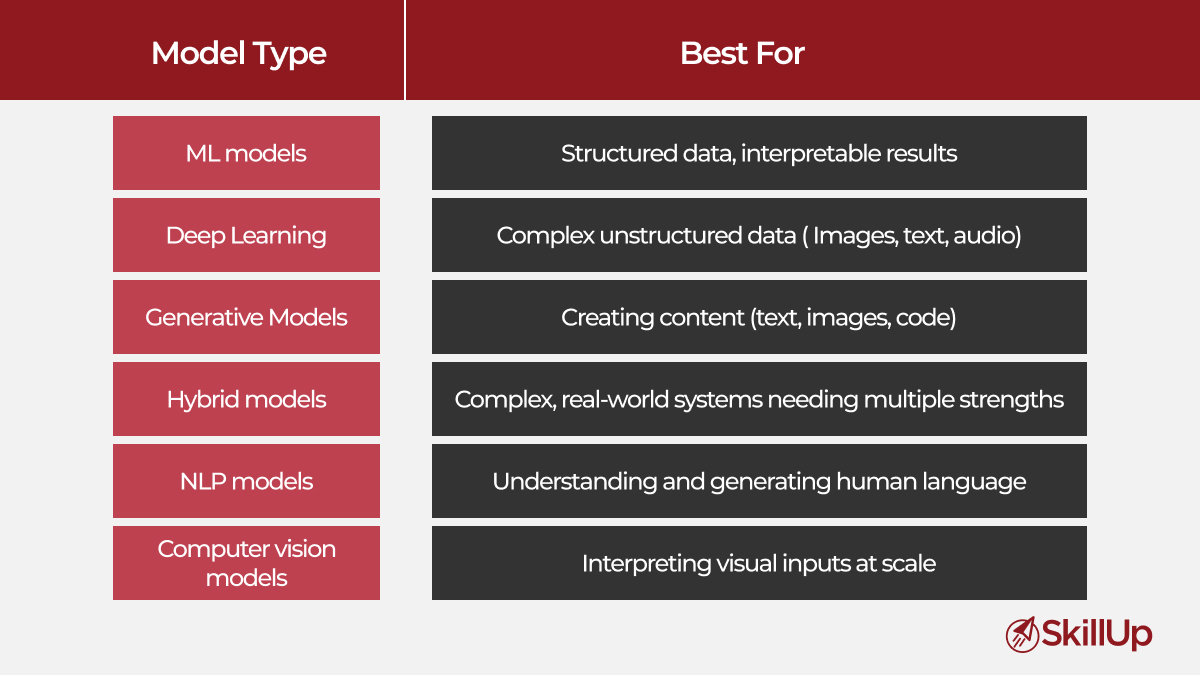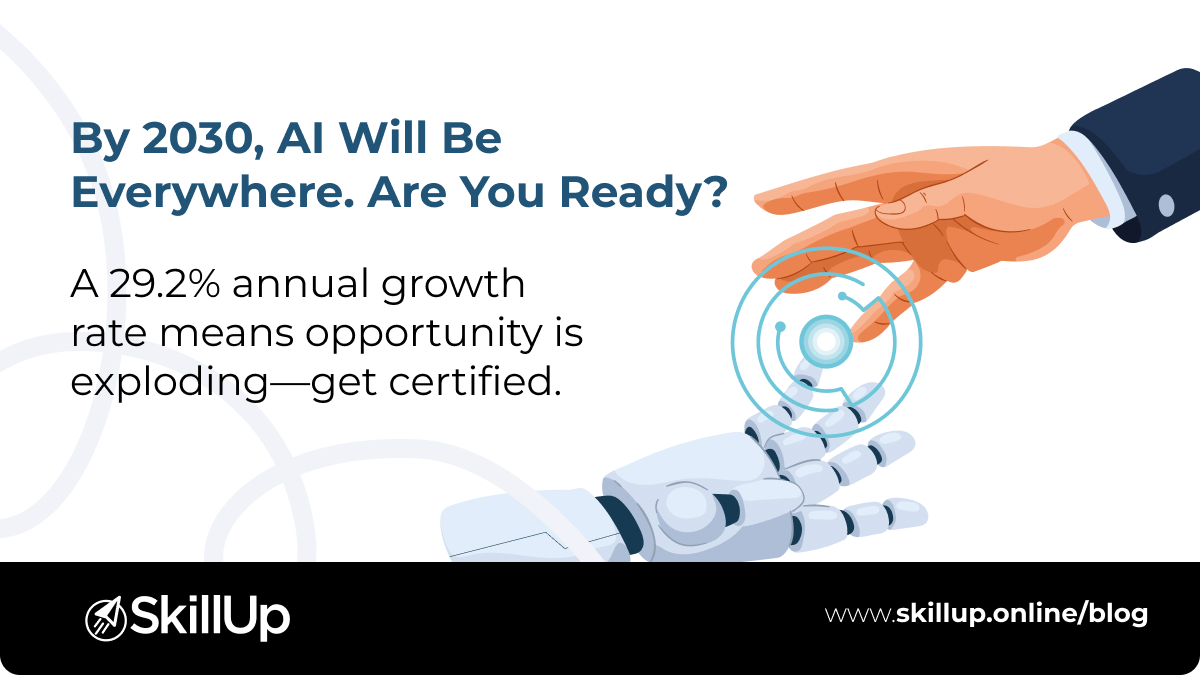In today’s data-driven world, the ability to interpret and leverage data is no longer confined to data scientists and tech experts. The increasing accessibility of machine learning (ML) tools and platforms has enabled a broader range of professionals to leverage data in business strategies.
According to the National Library of Medicine, The digital world has a wealth of dataco from sources such as the Internet of Things (IoT), businesses, healthcare, mobile devices, urban environments, and security systems, among others. Extracting knowledge or valuable insights from this data can be leveraged for smart decision-making across various application domains.
This guide shows you how to harness the power of ML to enhance your skills and boost your career as a non-technical professional.
Why Machine Learning Matters for Non-Techies
For non-techies, delving into ML might seem daunting, yet its career growth and operational efficiency rewards are unparalleled. According to Payscale on average, machine learning professionals can earn a salary of $118,497 per year, highlighting the lucrative potential of acquiring these skills. ML’s ability to analyze vast datasets and extract actionable insights is revolutionizing decision-making processes. As a result, employers are increasingly seeking professionals with ML skills, recognizing the significant value these capabilities add to strategic operations and overall efficiency.
The relevance of ML extends beyond traditional tech roles, permeating fields such as marketing, where it can predict consumer behavior; finance, where it aids in risk assessment and fraud detection; and even healthcare, where ML algorithms improve patient diagnostics and treatment plans. This cross-industry applicability underscores the importance of ML literacy for professionals aiming to stay ahead in their respective domains.
Moreover, acquiring ML knowledge can significantly enhance your collaboration with technical teams, fostering a more cohesive and innovative workplace environment. Understanding the basics of ML enables you to contribute valuable insights to tech-driven projects and initiatives, bridging the gap between technical and non-technical domains.
Intrigued by the prospect of integrating ML into your career but still needing to figure out where to start? SkillUp Online offers a range of beginner-friendly courses designed to discover the field AI and data science.
Check out our blog for more insights about 👉 average salary of machine learning professionals.
Understanding the Basics of ML
At its core, machine Learning is about enabling computers to learn from and make decisions based on data without being explicitly programmed for every possible scenario. It might sound like a concept reserved for those with deep technical expertise, but the fundamentals of ML can be understood by anyone willing to explore its principles.
At the heart of ML is algorithms — sets of rules or instructions that computers follow to perform tasks. These algorithms improve automatically through experience, which is where the “learning” in machine learning comes from. For instance, an ML algorithm used by an e-commerce website can learn from past purchase data to predict what products a customer might be interested in.
There are mainly two types of ML that you’ll come across:
- Supervised Learning: This involves teaching the computer using data that is already labelled. It’s like learning with a teacher who provides you with the questions and the correct answers, so over time, you know to associate questions with the right answers.
- Unsupervised Learning: The data isn’t labelled here, so the computer looks for patterns and relationships in the data to learn. It’s akin to learning without a teacher, where you try to make sense of information based on the patterns and connections you discover.
For non-tech professionals, understanding these basic concepts is crucial for leveraging ML tools in your work, whether analyzing customer data, forecasting trends, or automating repetitive tasks. By grasping the basics, you can see how ML can be applied to streamline operations, enhance decision-making, and drive innovation in your field.
To dive in deeper for a better understanding, SkillUp Online’s course, “Analyzing Data with Python,” offers a gentle introduction to data analysis and ML basics. This course can be a practical first step in applying ML concepts to your work, providing hands-on experience with real-world data and ML tools.
Choosing the Right ML Course
As a non-technical professional, embarking on a journey to learn machine learning (ML) can be exhilarating. However, the plethora of course options can also make it daunting to choose the right one. The key is to find a course that bridges the gap between complex ML concepts and their practical applications in a non-technical context.
Here are some critical factors to consider when selecting an ML course:
- Content Relevance: Ensure the course content is designed for beginners and focuses on the foundational aspects of ML without delving too deeply into technical jargon or advanced mathematical concepts. Look for courses that offer real-world examples and case studies relevant to your field.
- Practical Application: Opt for a course emphasizing hands-on learning through projects and exercises. This approach allows you to apply what you learn directly to your work, making the educational experience more tangible and immediately beneficial.
- Instructor Expertise: The background and experience of the instructor can significantly impact your learning. Instructors with a blend of academic knowledge and industry experience can often provide you with more insightful perspectives and practical applications of ML concepts.
- Learning Flexibility: For working professionals, finding a course that offers flexibility in pacing, access to materials, and deadlines is crucial. Online courses with on-demand content can be particularly beneficial, allowing you to learn at your own pace alongside your professional commitments.
- Post-Course Support: Consider courses that offer continued support post-completion, such as forums, alumni networks, or additional resources. This support can be invaluable as you apply your new skills in real-world scenarios.
A program that stands out in these areas is the TechMaster Certificate Program in Artificial Intelligence (AI) with Data Science. This program covers the essentials of AI and ML, focusing on practical applications and real-world case studies to ensure you can translate your knowledge into actionable skills in your respective fields.
As a non-technical professional, choosing the right ML course involves balancing a comprehensive curriculum with practical learning opportunities which are tailored to your needs and constraints. Considering these factors, you can select a course that educates and empowers you to leverage ML in your career.
Top ML Courses for Beginners
Diving into the machine learning (ML) world can be easy, especially with courses designed to ease beginners into the field. Here are some top ML courses tailored for non-tech professionals, each offering a unique approach to making ML concepts accessible and applicable:
- Analyzing Data with Python – This course stands out for its focus on practical data analysis skills using Python, a popular programming language in the ML community. It’s ideal for beginners looking to understand data manipulation and visualization; these are foundational steps towards mastering ML. The course emphasizes hands-on learning with real datasets, making it highly relevant for professionals seeking to apply ML insights in their roles.
- Foundation of Artificial Intelligence & Machine Learning – Aimed at discovering AI and ML for newcomers, this course covers basic concepts and terminologies, making it perfect for someone like you who is starting from scratch. It offers a broad overview of AI applications in various industries, helping you see the potential impact of AI and ML.
- DP-900: Microsoft Azure Data Fundamentals – if you are interested in cloud computing and its role in ML, this course provides a solid foundation in data concepts on Azure, one of the leading cloud platforms. It’s suitable for beginners like you who want to understand how cloud services support ML and data analytics, with no prior technical knowledge required.
- Python for Data Science – This course is specifically designed for someone who is new to data science and ML, focusing on Python programming skills. It covers essential topics such as data manipulation, basic data analysis, and an introduction to ML with Python, making it a comprehensive starting point for aspiring data professionals like you.
5. DP-100: Designing and Implementing a Data Science Solution on Azure – While slightly more advanced, this course is still accessible to beginners, especially those who have completed the Azure Data Fundamentals course. It delves into designing and implementing data science solutions on Azure, offering practical experience with ML models and data science processes.
Applying ML Knowledge in Non-Tech Roles
Machine learning is not just a tool for data scientists and tech experts; it’s a versatile asset that non-tech professionals like you can leverage to improve your work significantly. By understanding the basics of ML, you can unlock a world of opportunities to innovate and streamline tasks in various non-technical roles:
- Marketing: ML can revolutionize how marketers understand and engage with their audience. For instance, ML algorithms can analyze customer data to predict purchasing behaviors, enabling marketers to create more targeted campaigns. Tools like customer segmentation models help personalize marketing efforts, significantly improving engagement rates and ROI.
- Human Resources (HR): In HR, ML can enhance talent acquisition and employee retention strategies. By analyzing patterns in employee data, ML can help identify the traits of high-performing individuals, improving recruitment processes. Similarly, ML can predict employee turnover, allowing HR professionals to implement pre-emptive retention strategies.
- Finance: For finance professionals, ML offers powerful tools for risk management and fraud detection. By analyzing transaction patterns, ML algorithms can identify anomalies that may indicate fraudulent activity, enabling quicker response times and minimizing financial losses.
- Operations: In operational roles, ML can optimize supply chain management by predicting demand fluctuations, identifying bottlenecks, and suggesting improvements. This predictive capacity helps maintain optimal inventory levels, reduce waste, and improve efficiency.
- Customer Service: ML-driven chatbots and virtual assistants can significantly enhance customer service by providing instant, personalized responses to customer queries. It improves customer satisfaction and frees human agents to handle more complex issues.
The key is to start small, experiment with ML tools relevant to your field, and gradually expand your ML use as you become more comfortable with the technology.
Overcoming Challenges in Learning ML
Embarking on the path to learning machine learning (ML) can seem steep, especially for non-tech professionals. However, recognizing and addressing the common challenges upfront can make the journey more manageable and rewarding and help you:
- Demystify Mathematical Concepts: ML involves mathematical and statistical concepts that might initially seem daunting. Overcome this by seeking resources that simplify these concepts, using visual aids and real-world examples.
- Navigate Coding Requirements: Coding is a fundamental aspect of ML, but you don’t need to be an expert to get started. Focus on learning Python, a beginner-friendly programming language widely used in ML. Resources like Codecademy and the Python for Data Science course by SkillUp Online offer interactive tutorials that can help you grasp coding basics in the context of data analysis and ML.
- Choose the Right Starting Point: The vastness of ML can be overwhelming. Begin with a broad overview course that introduces key ML concepts and gradually specialize based on your interests and industry needs. The Introduction to AI Fundamentals course is an excellent starting point, offering insights into AI and ML without overwhelming beginners with technical details.
- Apply Your Knowledge to Real-World Problems: Reinforce your learning by using ML concepts to real-world scenarios in your field. Participate in online communities like Kaggle, where you can practice solving ML problems and learn from the global community of ML practitioners.
- Stay Motivated and Consistent: Learning ML is a marathon, not a sprint. Set realistic goals, celebrate small victories, and connect with peers also learning ML. Joining study groups or online forums can provide moral support, motivation, and shared learning opportunities.
- Seek Additional Support When Needed: Don’t hesitate to seek help when you hit a roadblock. Many online courses, including those offered by SkillUp Online, provide forums where you can ask questions and receive guidance from instructors or fellow learners.
- By acknowledging and strategically tackling these challenges, non-tech professionals can navigate the ML learning curve more effectively. Remember, every ML expert started as a beginner, and perseverance, curiosity, and the right resources are key to transitioning from novice to proficient.
Next Steps After Completing an ML Course
Completing a beginner’s course in machine learning is a significant milestone, marking just the beginning of your journey in harnessing the power of ML in your career. Here are some next steps to consider for furthering your knowledge and applying your skills.
- Apply What You’ve Learned: Integrate ML insights into your current role. Look for opportunities to apply ML solutions to business problems, whether it’s automating routine tasks, enhancing data analysis, or improving decision-making processes. Practical application will deepen your understanding and demonstrate the value of ML in your field.
- Engage in Real-World Projects: Participate in ML projects or competitions on platforms like Kaggle. These projects can help you apply your skills to real-world problems, build your portfolio, and gain recognition in the ML community.
- Join ML Communities: Connect with ML enthusiasts and professionals by joining online forums, attending webinars, and participating in local meetups or conferences. Communities like Reddit’s r/Machine Learning, Stack Overflow, and LinkedIn groups can be great resources for learning, networking, and staying informed about industry trends.
- Continue Your Education: Consider taking intermediate or advanced ML courses focusing on specific areas of interest or industry applications.
- Update Your Resume and LinkedIn Profile: Highlight your newly acquired ML skills prominently on your resume and LinkedIn profile. Include specific details about the course you completed, any projects you worked on, and the skills you gained. This will make you more attractive to potential employers searching for candidates with ML expertise.
- Stay Informed: The field of ML is rapidly evolving, with new tools, techniques, and applications emerging regularly. Follow leading ML blogs, podcasts, and publications to keep abreast of the latest developments and explore how they might impact your field.
- Explore Certification: Earning a certification in ML or a related field can validate your skills and knowledge, making you more attractive to employers. Look for reputable certification programs that blend theoretical understanding and practical application.
- Mentorship and Networking: Seek mentorship from experienced ML professionals who can provide guidance, feedback, and insights from their career paths. Additionally, networking can open doors to new opportunities and collaborations in the field of ML.
By taking these steps, you can build on the foundation laid by your beginner’s ML course, expanding your skills and making ML an asset in your professional toolkit. The key is to stay curious, proactive, and engaged with the ML community as you explore this dynamic and impactful field.
Embracing ML in Your Career
Embracing machine learning is a transformative step for non-tech professionals seeking to advance their careers. By continuing to explore ML, you’ll boost your skill set and contribute to a forward-thinking, data-driven professional environment.
If you’re eager to build the necessary skills and kickstart your journey as a machine learning professional, our Learner Support Team is here to help. Contact us at [email protected], and we’ll gladly guide you on your next steps. With the proper guidance and resources, your journey in the dynamic world of data science is just beginning.
SkillUp Online
